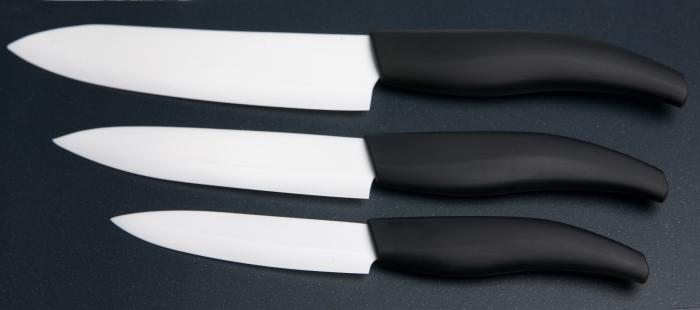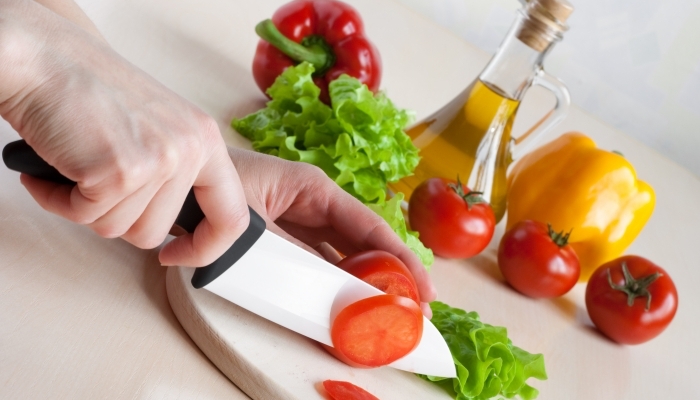If you are lucky enough to own a few ceramic knives or are considering purchasing some ceramic knives for your own kitchen, I am sure that you might have pondered how you would go about caring for them.
I am lucky enough to own a whole set of ceramic knives and today I want to share with you a few things which I have learned about caring for them.
Quick Info on Ceramic Knives
Ceramic Knives are quite different than usual knives. They are created from Zirconium Oxide which is a substance that is harder than traditional steel.
This makes them much prized for their extraordinary sharpness and durability.
It is possible to break them, however. I have had the tip broken off my ceramic paring knife and it pains me to no end because it is one of my favorite knives.
It is also something which could have been easily prevented.
Safety First
- Always be aware that these are incredibly sharp knives and they will cut you if you use them improperly.
- Always cut with the blade away from your fingers and hands.
Just a little safety tip there. I can’t tell you the number of times I have cut my fingers with my ceramic paring knife by holding the item I am cutting in one hand and cutting towards it with the knife with my other hand.
This is a bad practice and habit to get into. The sharpness of a good ceramic knife, however, is all a part of their charm.
1. Don’t Cut Hard Items
Because they are exceptionally hard, these are knives that will easily slice right through most fruits, vegetables, and boneless meats. They can also be used to crush garlic and peel fruit.
It is not recommended that you use them to cut through bone, nuts, frozen food, or hard cheeses.
This is because the strength and momentum behind such actions can result in them landing on the cutting board with excessive force, endangering the tips, or compromising the blades.
2. Don’t Cut Cans, Plastic, & Even Cardboard
It’s also not recommended that you use them to cut tin cans, plastic or carboard tubes. They are meant to be used with food items, and them alone!
As tempting as it might be to use them as anything other than a knife, just don’t!
3. Don’t Pry Lids, Use It as a Screwdriver, or Smash Things
They are not meant to pry lids off jars, or to be used as screw drivers. Smashing cloves of garlic and herbs or grinding salt or even pepper corns, these are also big no-no’s when it comes to ceramic knives.
Please don’t do these things ever! Not if you truly value your knives. To do so can truly endanger and damage your blades.
4. No Glass, Stone, Marble, or China for Cutting Surfaces
The surface you choose to use for a cutting board when using Ceramic Knives is just as important as how you use them.
You should never use glass, stone or marble cutting boards, or china plates for that matter.
Again, this is because these surfaces are ultra-hard, without any give. This results in push-back which can harm, dull and easily damage the tips and blades of your ceramic knives.
I would only ever use wood, plastic or bamboo as a cutting surface. These are much gentler on the knife’s edge.
5. Always Clean Ceramic Knives by Hand
You should always clean your ceramic knives by hand. Warm soapy water is best.
The use of a good mild dish soap rather than harsh detergents is the ideal way to go.
You don’t want to be using anything that might eat away at them (or your hands for that matter)!

6. Don’t Use Abrasive Scrubbers
It is also not recommended using strident objects such as steel wool or other abrasive scrubbers to clean them.
If you always make it a habit to clean your knives frequently during use, and always right after use, you will find that you won’t need to use anything stronger than a cloth and some warm water to clean them because you will find that you won’t have any food that is actually stuck to the knife.
I also keep a warm damp cloth handy when I am cutting so that I can easily and safely wipe the blade clean right at my cutting station.
7. Never Put Them in the Dishwasher
It is not really recommended that you clean ceramic knives in a dishwasher, as tempting as this might be!
The strength of spray from the dishwasher’s arms can cause quite a bit of agitation, bumping your knives into other objects which can result in chipping or breakage.
The heat required for the water in a dishwasher might also contribute to the degradation of the glues which are used to bond some blades to their handles.
It is important to note that I never place any of my knives in the dishwasher. I feel that by my washing and drying them by hand I am prolonging the life and sharpness of all my blades. The extra little bit of time and effort it takes is always worth it.
8. Use the Protective Sheath
Often a quality knife with a ceramic blade will come with a protective sheath for storage. Sheaths are great for helping to prevent your ceramic kitchen knife from banging against other knives in your kitchen drawer.
In all honesty, however, I don’t store any of my knives in kitchen drawers.
Personally, I find it to be a very dangerous practice and it doesn’t really help to prolong the life or edge of any knife. This is particularly true of Ceramic Knives. Y
ou really don’t want them banging up against other items in a drawer that is going to be opening and shutting frequently.
9. If Not, Use a Knife Block
Ideally, you should have a bamboo or wood knife block to store your knives in. You can also find acrylic or plastic holders, which have become very popular as of late.
They are not only easy on your knives but keeping them clean is also very simple.
Important Tip: Did you know that some studies have found that one of the dirtiest places in the kitchen is inside the slots of your knife block! I know! Having previously read about this hazard, I now make sure to take extra care and hoover out my knife block frequently. It is surprising the amount of dust, crumbs and other undesirables that find their way into the slots! You can even take all the knives out and give it a good shake over a piece of kitchen paper. You will be amazed at what comes out!
10. Go to a Professional for Help
Proper ceramic knife care means that your knives will stay sharper for much longer than a regular steel knife.
Over time you might find that there is a bit of wear, and in my case a broken tip might occur.
Chips and broken tips can very often be smoothed and rounded out by taking them to one of those professional sharpening services.
A professional knife sharpener will use a diamond sharpener and other sharpeners for ceramic to help your knife blades stay sharp longer.
You can also purchase an electric or battery-operated ceramic knife sharpener to do the job but do take note that unless the knife grinders are diamond coated it is not recommended that you use them.
These are not the same sharpeners that you use to sharpen regular steel knives.

Ceramic Knives Can Last a Lifetime!
Happily, however, with proper care, use and storage there is no reason why your ceramic knife should not last a lifetime with little to no problems!